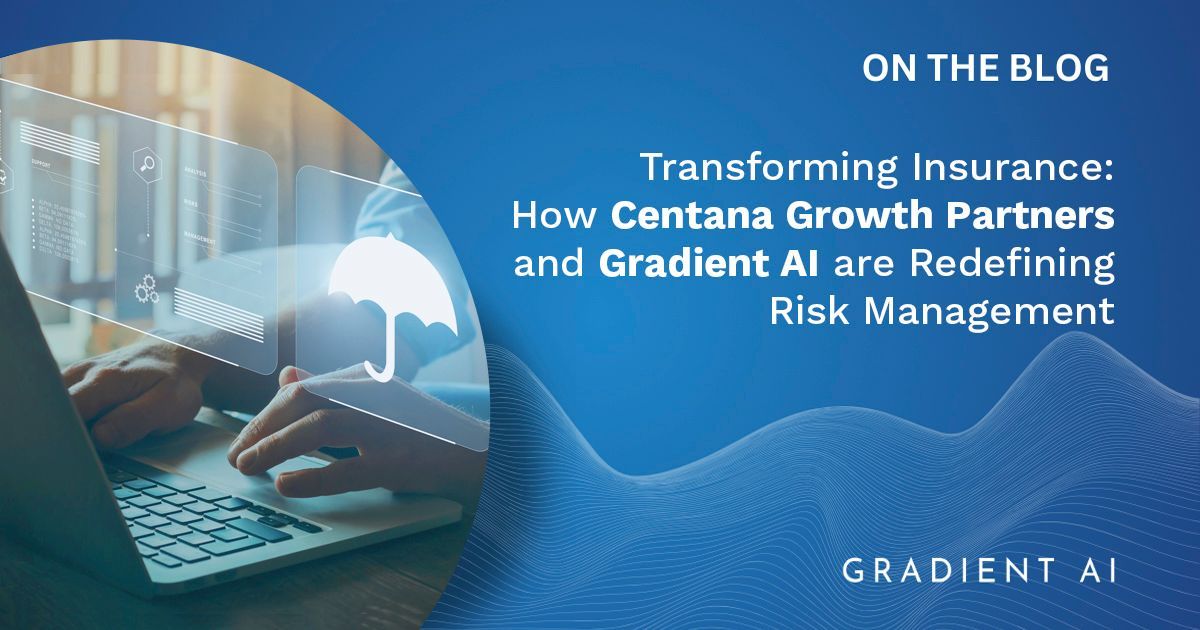Transforming Insurance: How Centana Growth Partners and Gradient AI are Redefining Risk Management
This is a summary of an article that first appeared on Centana’s website on July 30, 2024. You can read the original here: “Why Centana is Leading Gradient AI’s Series C”.
Centana Growth Partners recently led a $56 million Series C round in Gradient AI. This investment was based on Centana’s deep experience investing in enterprise solutions serving the insurance and financial services ecosystem, including a strong focus on underwriting software and AI infrastructure. The firm’s thematic work and long-time connections to multiple companies in the insurance industry including insurance carriers, brokers, employer groups, and more, highlighted the necessity of data-driven tools to help insurers grow profitably.
Centana’s decision to lead the round underscores the transformative potential of artificial intelligence in the insurance sector. Here’s a peek into why Centana believes that this partnership is poised to revolutionize the industry.
The Critical Role of Risk Management in Insurance
Risk management is crucial in the insurance industry, in both underwriting and claims. Effective underwriting involves evaluating new and existing policyholders to assess risk factors and price policies accurately, enabling the insurer to maintain healthy loss ratios and drive profitable growth. On the other end of the business, claims management involves processing thousands of complex claims annually, ranging from workplace injuries to high-cost medical cases. Efficiently prioritizing and managing these claims helps insurers control costs, while enabling policyholders to recover faster.
AI’s Impact on Underwriting and Claims Management
Traditional underwriting can require significant manual effort. Health insurance underwriters, for instance, have relied on health questionnaires and actuarial consultants, often resulting in suboptimal outcomes, and missed opportunities due to gaps in claims and health histories. Regulatory changes, such as the Affordable Care Act, have further complicated the process by restricting the use of disclosed health histories in underwriting.
In claims management, insurers must consider numerous attributes to determine the appropriate action for each claim, whether it involves settling, contesting, or requesting additional information. This complex process requires navigating many questions and decisions related to costs, claim reserves, potential legal representation, and other factors. Handling serious claims, particularly those involving major injuries, demands particular attention and expertise. Some of the most problematic cases begin as minor issues but escalate into high-cost claims. In the worst scenarios, these claims grow unnoticed until they become catastrophic cost drivers, often too late for insurers to control expenses effectively.
AI addresses these underwriting and claims management issues:
- AI in Underwriting: AI-driven models leverage third-party data sources, such as anonymized medical, lab and prescription records, to enhance the accuracy of risk assessments, helping to predict health indicators and future claims. This leads to better pricing and improved customer experiences.
- AI in Claims Management: Managing a claim involves numerous attributes and decisions, from settlement to legal considerations. AI provides insights into claim histories and future trajectories, enabling insurers to prioritize and proactively address potential high-cost outcomes.
Gradient AI’s Cutting-Edge Insurance Solutions
Centana believes that Gradient AI’s AI solutions for insurers stand out for their ability to deliver predictive analytics and data-driven insights across the group health and property and casualty insurance markets, offering insurers a deeper understanding of risk and performance with:
- Enhanced Underwriting: Gradient’s AI-driven health underwriting product, SAIL, provides risk scores for new employee groups, aiding underwriters in making informed decisions. This solution is both explainable and HIPAA-compliant, ensuring transparency and regulatory adherence.
- Improved Claims Management: Insurers using Gradient AI’s P&C and Workers’ Comp solutions benefit from superior visibility into claims, allowing them to act swiftly and effectively to mitigate costs.
Looking Ahead: Centana and Gradient AI Bring Complementary Strengths to the Partnership
Centana brings extensive experience in investing in enterprise solutions for the insurance and financial services sectors. Their team focus on underwriting software and AI infrastructure aligns with Gradient AI’s mission to transform insurance operations.
Centana believes that Gradient AI, under the leadership of Founder & CEO Stan Smith, is well-positioned to lead the industry in AI-driven underwriting and claims management. With decades of experience in insurance, healthcare, and software, Stan and his team have built a strong foundation for continued innovation and growth. Centana’s investment will enable Gradient AI to further invest in product development and market expansion, solidifying its competitive edge and enhancing customer satisfaction.
The partnership between Centana and Gradient AI marks a milestone in the evolution of the insurance industry. By leveraging AI to enhance underwriting and claims management, insurers can achieve better risk assessment, improve operational efficiency, and ultimately drive profitability. As the global market for AI in insurance continues to grow, Gradient AI’s innovative solutions and Centana’s backing are set to lead the way in transforming the sector.
>> This is a summary of an article that first appeared on Centana’s website on July 30, 2024. You can read the original here: “Why Centana is Leading Gradient AI’s Series C”.


